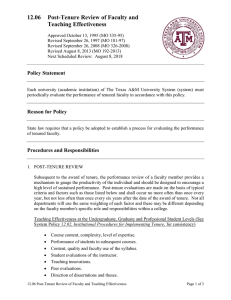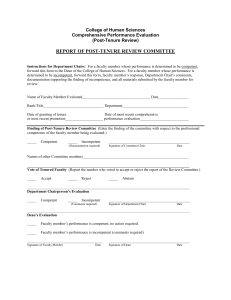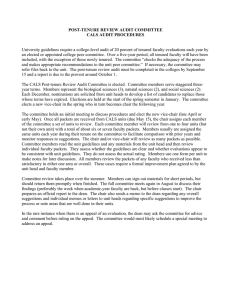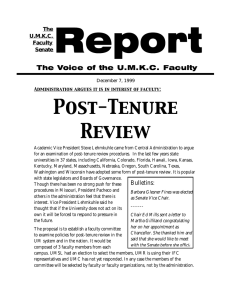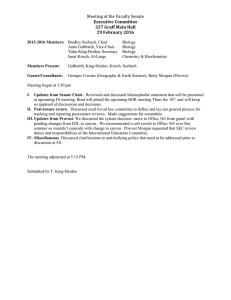SUMMARY OF UW INSTITUTIONS’ POST-TENURE REVIEW POLICIES AND PROCEDURES
advertisement
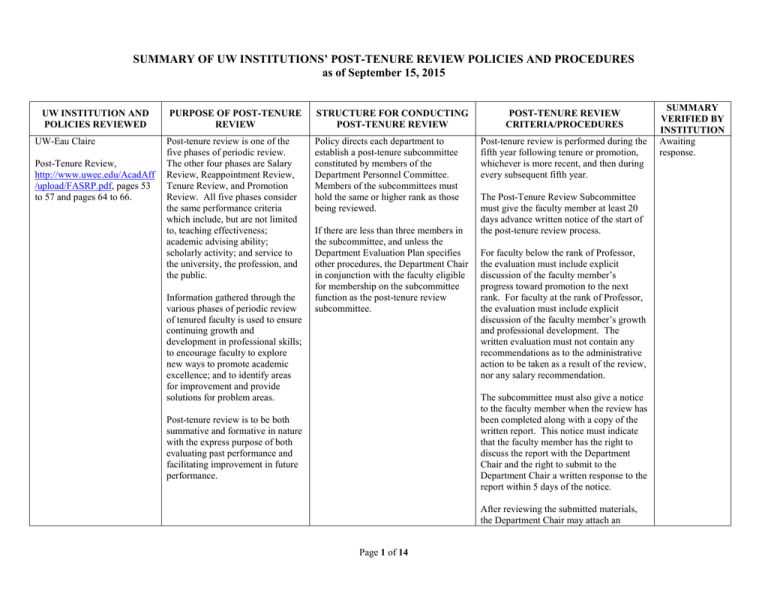
SUMMARY OF UW INSTITUTIONS’ POST-TENURE REVIEW POLICIES AND PROCEDURES as of September 15, 2015 UW INSTITUTION AND POLICIES REVIEWED UW-Eau Claire Post-Tenure Review, http://www.uwec.edu/AcadAff /upload/FASRP.pdf, pages 53 to 57 and pages 64 to 66. PURPOSE OF POST-TENURE REVIEW STRUCTURE FOR CONDUCTING POST-TENURE REVIEW Post-tenure review is one of the five phases of periodic review. The other four phases are Salary Review, Reappointment Review, Tenure Review, and Promotion Review. All five phases consider the same performance criteria which include, but are not limited to, teaching effectiveness; academic advising ability; scholarly activity; and service to the university, the profession, and the public. Policy directs each department to establish a post-tenure subcommittee constituted by members of the Department Personnel Committee. Members of the subcommittees must hold the same or higher rank as those being reviewed. Information gathered through the various phases of periodic review of tenured faculty is used to ensure continuing growth and development in professional skills; to encourage faculty to explore new ways to promote academic excellence; and to identify areas for improvement and provide solutions for problem areas. If there are less than three members in the subcommittee, and unless the Department Evaluation Plan specifies other procedures, the Department Chair in conjunction with the faculty eligible for membership on the subcommittee function as the post-tenure review subcommittee. POST-TENURE REVIEW CRITERIA/PROCEDURES Post-tenure review is performed during the fifth year following tenure or promotion, whichever is more recent, and then during every subsequent fifth year. The Post-Tenure Review Subcommittee must give the faculty member at least 20 days advance written notice of the start of the post-tenure review process. For faculty below the rank of Professor, the evaluation must include explicit discussion of the faculty member’s progress toward promotion to the next rank. For faculty at the rank of Professor, the evaluation must include explicit discussion of the faculty member’s growth and professional development. The written evaluation must not contain any recommendations as to the administrative action to be taken as a result of the review, nor any salary recommendation. The subcommittee must also give a notice to the faculty member when the review has been completed along with a copy of the written report. This notice must indicate that the faculty member has the right to discuss the report with the Department Chair and the right to submit to the Department Chair a written response to the report within 5 days of the notice. Post-tenure review is to be both summative and formative in nature with the express purpose of both evaluating past performance and facilitating improvement in future performance. After reviewing the submitted materials, the Department Chair may attach an Page 1 of 14 SUMMARY VERIFIED BY INSTITUTION Awaiting response. UW INSTITUTION AND POLICIES REVIEWED PURPOSE OF POST-TENURE REVIEW STRUCTURE FOR CONDUCTING POST-TENURE REVIEW POST-TENURE REVIEW CRITERIA/PROCEDURES SUMMARY VERIFIED BY INSTITUTION additional written response to the subcommittee report and return the evaluation and any responses to the faculty member. UW-Green Bay Guidelines for Tenured Faculty Review and Development (in Faculty Handbook), http://www.uwgb.edu/sofas/rul es/facultyhandbook.pdf, page 99. Tenured faculty members undergo performance reviews (conducted every other year) and post-tenure reviews. Reviews are conducted by the units, employing procedures to be determined by the unit. The results are shared with the appropriate Dean(s). Post-tenure review may be conducted as part of the merit review process or as a special review and should be a formative process with the goal of faculty development. The review is performed by either the unit executive committee or by a review committee agreed to by the executive committee. The review is not a re-tenuring process and does not invoke continuation or loss of tenure as an outcome of the process. Post-tenure review is based on a professional development proposal which the faculty member has prepared in concert with the unit. In this proposal, the faculty member is asked to set forth his or her professional development, including teaching, scholarship, outreach and service. If the review determines that the faculty is not effectively pursuing the professional development proposal agreed to by the faculty member and the unit, the faculty member and the unit will develop a plan designed to assist the faculty member in doing so. The review is both prospective as well as retrospective with the faculty member encouraged to present his or her plans and priorities for upcoming years as well as accomplishments since the preceding review. In addition to the professional development proposal, documentation for the review includes all materials prepared for merit reviews and promotions since the previous review. Units assess the faculty member's professional development proposal and accomplishments and, if specific needs for improvement are identified, a plan for this purpose is developed jointly by the faculty member and the unit executive committee. The review takes place on a regular schedule as determined by the academic Page 2 of 14 Awaiting response. UW INSTITUTION AND POLICIES REVIEWED UW-La Crosse PURPOSE OF POST-TENURE REVIEW STRUCTURE FOR CONDUCTING POST-TENURE REVIEW POST-TENURE REVIEW CRITERIA/PROCEDURES unit but within the five-year requirement in Regent policy. Departmental by-laws serve as a faculty member’s guide regarding specific faculty responsibilities of teaching, scholarship and service, merit evaluation, and faculty personnel review as it relates to retention, promotion, and tenure. The by-laws template outlines the key policies and procedures associated with faculty functions under the guidance of UW System and Wisconsin state statutes and regulations and UWL’s Faculty Senate. The by-laws template for UWL provides the following guidance regarding post-tenure review: SUMMARY VERIFIED BY INSTITUTION Yes. “Must have a policy regarding a written post-tenure review in line with UW Regent Policy Document 20-9 that indicates a review at least once every five years of each tenured faculty member’s activities and performance, in accordance with the mission of the department, college, and institution.” UW-La Crosse Biology Department Bylaws, http://www.uwlax.edu/uploade dFiles/Academics/Colleges_Sc hools/Science_and_Health/Bio logy%20Bylaws%202014.pdf, Section 6 and Appendix D. Tenured faculty members undergo annual merit review and posttenure review. Post-tenure review is conducted by the Department Chair. The purpose of post-tenure review is to determine whether performance is satisfactory in each of the areas of faculty responsibility. This review is based on the results of the annual review for the five preceding years. Post-tenure review is conducted at least once every five years, and is based on results of the annual merit review for the five preceding years. For each annual merit review, faculty members receive a composite performance rating of Satisfactory or Unsatisfactory. Faculty members who receive Exceptional (E), Good (G), or Satisfactory (S) performance ratings for all five years receive a composite rating of Satisfactory. Faculty members who received three or more Unsatisfactory composite performance ratings over the five-year review period or two or more Unsatisfactory composite performance ratings in any one category over the fiveyear review period are considered to have an Unsatisfactory performance rating for the five-year post-tenure review period, pending further review by the Committeeof-the-Whole (COTW). If the COTW determines that a faculty member’s performance is Unsatisfactory, the Chair will establish a Faculty Development Plan Committee to develop a Page 3 of 14 Yes. UW INSTITUTION AND POLICIES REVIEWED PURPOSE OF POST-TENURE REVIEW STRUCTURE FOR CONDUCTING POST-TENURE REVIEW POST-TENURE REVIEW CRITERIA/PROCEDURES SUMMARY VERIFIED BY INSTITUTION faculty development plan to remedy areas of concern identified by the COTW. The faculty member is given two annual evaluation periods (two years) to remedy the areas of concern. The Faculty Development Plan Committee meets with the faculty member to discuss progress annually. If the Faculty Development Plan Committee determines after the second annual meeting that areas of concern have not been remedied, results of the post-tenure review and the Faculty Development Plan are forwarded to the Dean for consideration of further action. UW-La Crosse Psychology Department Bylaws, http://www.uwlax.edu/uploade dFiles/Academics/Colleges_Sc hools/CLS/PSY%20Bylaws% 2020130315.pdf, Section VI.C, page 22. Faculty members are reviewed every year for merit. One purpose of the annual review is to determine how merit pay is to be distributed. During post-tenure review, data gathered from annual merit reviews can be used as a continuous quality improvement tool for tenured faculty. One part of the post-tenure review is aimed at detecting areas of concern. Annual merit reviews are conducted by the Peer Evaluation and Merit Review (PEM) Committee. PEM Committee members are comprised of three psychology faculty members, one of whom is the Department Chair, and a fourth person chosen by the faculty candidate. Three committee members must be tenured. Post-tenure review is conducted by the Department Chair. Faculty members are reviewed every year for merit. Post-tenure review is conducted once every five years. At post-tenure review, the Chair reviews the faculty member’s past five years of merit review and writes a letter providing general trends in the areas of teaching, scholarship, and service. Copies of the letter are provided to the faculty member and the Dean’s office. An area – teaching, scholarship, and service – is deemed an area of concern if the faculty member is not performing the expected activities at a satisfactory level. Page 4 of 14 Yes. UW INSTITUTION AND POLICIES REVIEWED UW-Madison Faculty Legislation II-106 Policy on Review of Tenured Faculty, https://www.secfac.wisc.edu/7 43.htm#106 PURPOSE OF POST-TENURE REVIEW STRUCTURE FOR CONDUCTING POST-TENURE REVIEW The purpose of the review of tenured faculty is to assess periodically each faculty member's activities and performance, in accordance with the mission of the department, college, and institution in such a way as to determine that the faculty member is meeting his or her obligations to the university and the State of Wisconsin. The review is to be appropriately linked to the merit process. Policy directs each department’s executive committee to establish written criteria and procedures. Review is to be carried out by one or more tenured faculty members. No individual shall serve as a reviewer if the faculty member under review formally objects to his or her service in that capacity. In the case of a faculty member with appointments in more than one department, the department chairs of the affected departments determine procedures for the conduct of the review. POST-TENURE REVIEW CRITERIA/PROCEDURES Post-tenure review is to occur at least once every five years. Post-tenure review may be incorporated into the annual merit review process or combined with promotion or other reviews. In the case of combined reviews, the department may require supplementary documentation from the faculty member. Review procedures must include: 1. 2. 3. A review of qualitative and quantitative evidence of the faculty member's performance over at least the previous five-year period. The evidence should include a current curriculum vitae, annual activity reports, teaching evaluations or summaries of evaluations, and other materials providing evidence of the faculty member's accomplishments and contributions that the department or the faculty member feel are relevant to the review. Discussion with the faculty member about his or her contributions to the profession, the department and the University if either the reviewers or the faculty member so desire. Appropriate consideration of a faculty member's contributions outside the department to interdisciplinary and other programs, governance, and administration. The reviewers can consider other steps that would be useful in making a fair and informed judgment, including but not limited to consultation with individuals Page 5 of 14 SUMMARY VERIFIED BY INSTITUTION Yes. UW INSTITUTION AND POLICIES REVIEWED PURPOSE OF POST-TENURE REVIEW STRUCTURE FOR CONDUCTING POST-TENURE REVIEW POST-TENURE REVIEW CRITERIA/PROCEDURES SUMMARY VERIFIED BY INSTITUTION who have knowledge of the faculty member's work. UW-Milwaukee Tenured Faculty Review (in Policies and Procedures), http://www4.uwm.edu/secu/po licies/faculty/upload/May2015 P-P.pdf, Section 4.05 (2) (b). Tenured faculty reviews are intended as collegial assessments and provide an opportunity for faculty to review progress made on past performance plans and to propose future plans. Post-tenure reviews are conducted on a three to five year prospective timeline by the Executive Committee of the tenure home department. S-52.75, http://www4.uwm.edu/secu/do cs/other/S52.75.htm, Review of tenured faculty must use the criteria and procedures outlined in S-52.75. Yes. Procedures in S-52.75 call for all tenured faculty to develop a written 3 to 5 year Faculty Development Plan. The plan must include planned activities in teaching, research and service/outreach. The Department Executive Committee will then review the Faculty Development Plan with each faculty member for the (1) assessment of the individual's progress and (2) modification of individual plans as needed. The Executive Committee can use the Faculty Development Plans in their reviews for compensation. UW-Oshkosh The purpose of tenured faculty review is to appraise performance. Policy requires each college to identify a process for post-tenure review. FAC 6.3, Post-Tenure Review (in Faculty Handbook), http://www.uwosh.edu/provost /Main%20Highlight/handbook s/online-faculty-staffhandbook/faculty/facultychapter-six/facultyperformance-review/fac-6-3post-tenure-review All tenured faculty members who have not been promoted in rank in the past four years must participate in a performance appraisal. Policy requires each college’s process for post-tenure review to include: (1) General guidelines for the collection and assessment of evidence of quality teaching, professional and scholarly growth, and service. These guidelines must be consistent with the collection and assessment of such evidence in the merit process and in the promotion process. (2) A process for providing written feedback to faculty members being evaluated and for face-to-face feedback Page 6 of 14 Awaiting response. UW INSTITUTION AND POLICIES REVIEWED PURPOSE OF POST-TENURE REVIEW STRUCTURE FOR CONDUCTING POST-TENURE REVIEW POST-TENURE REVIEW CRITERIA/PROCEDURES SUMMARY VERIFIED BY INSTITUTION with the unit head and/or personnel committee representative. (3) A process for identifying those faculty members whose performance does not meet professional expectations in the areas of teaching, professional and scholarly growth, and service. For faculty who are not meeting expectations, a faculty development plan should be developed. The faculty development plan should outline major goals to be attained in order to eliminate the deficiencies. (4) Provision for using the results of the post tenure review in determining merit pay adjustments without conducting a separate merit review. (5) Provision for filing summaries of evaluations with the Provost and Vice Chancellor’s Office. Tenured faculty members with identified deficiencies could be required to develop a faculty development plan. UW-Parkside 6.10 Post-Tenure Reviews (in Faculty Handbook), http://www.uwp.edu/explore/o ffices/governance/uwpfchapter 6.cfm# Post-tenure review is not a retenuring process, but is a modification of the periodic review process with a component of faculty development. It is linked to the department program review cycle. Faculty prepares the dossier and submits it to the department executive committee (or designee) to review. The dossier and the evaluations of the department executive committee are forwarded to the Dean for review. The policy calls for post-tenure reviews to be conducted once every six years with an “update” half-way through the review period. The faculty prepares the post-tenure review dossier, which should include: (a) Current curriculum vitae. (b) Annual summaries for the period since the last review or since tenure. Evidence of accomplishments in teaching, research or creative activity, and service, as appropriate. (c) Previous post-tenure review evaluation (where applicable). Page 7 of 14 Yes. UW INSTITUTION AND POLICIES REVIEWED PURPOSE OF POST-TENURE REVIEW STRUCTURE FOR CONDUCTING POST-TENURE REVIEW POST-TENURE REVIEW CRITERIA/PROCEDURES SUMMARY VERIFIED BY INSTITUTION (d) Faculty member's statement of accomplishments during the review period. (e) Faculty member's development plan of activities for the upcoming period. The plan should identify personal goals in the context of departmental/institutional missions and goals. Rating for post-tenure reviews falls into three categories: (a) Approval (meets expectations or exceeds expectations). (b) Qualified approval (below expectations). (c) Approval withheld (below expectations, proposal for corrective action required). Proposal for corrective action is required for faculty members whose ratings fall in the Approval Withheld category. UW-Platteville Section 8 – Post Tenure Review (in University Rank, Salary, and Tenure (URST) Procedures, 2013-14), http://www.uwplatt.edu/files/b ilsa/crst_guidelines.pdf Post-tenure review may be conducted simultaneously with the faculty annual merit review. It is considered a supplement to the normal merit review. The purpose of the review is to encourage and support the growth and development of faculty that positively contributes to the mission and goals of the department, the college and the university. Post-tenure review is not a re-tenuring process. Post-tenure review is conducted by the Department Chair and the Dean. Post-tenure review is conducted on a fiveyear cycle. The faculty member completes Form 2, which includes a personal plan for continuing growth and development, and submits it to the Department Chair. The faculty member then meets with the Department Chair to address development needs of the faculty member Results of the post-tenure reviews are then transmitted by the Department Chair to the college Dean. If the faculty member’s review reveals a need for significant improvement, the Page 8 of 14 Awaiting response. UW INSTITUTION AND POLICIES REVIEWED PURPOSE OF POST-TENURE REVIEW STRUCTURE FOR CONDUCTING POST-TENURE REVIEW POST-TENURE REVIEW CRITERIA/PROCEDURES SUMMARY VERIFIED BY INSTITUTION Department Chair will report such to the college Dean. The Dean and the Chair will assist the faculty to find resources to fund appropriate future development plans of the faculty member. UW-River Falls 4.5.1 Post Tenure Review of Professional Activities of Faculty (in Faculty and Academic Staff Handbook, Chapter IV), https://www.uwrf.edu/Faculty Senate/Handbook/Chapter4/Ha ndbook4s5.cfm#CP_JUMP_15 3582 The purpose of post-tenure review is to inform each faculty member of his or her performance. The review may be conducted simultaneously with merit review or with promotion review. The academic units determine whether a committee of its tenured faculty or the Chair will conduct the review. Post-tenure review is conducted once every five years. Criteria for post-tenure are the same criteria used for renewal and nonrenewal of probationary appointments, which include effectiveness in teaching; professional involvement and accomplishments in research/scholarly/creative activity; and contributions at the department, college, university, community, state, national, or international level. The reviewer must review the teaching portfolio, the personal reflective statement and other pertinent data submitted by the faculty member, and discuss with the faculty member under review his or her performance in continuing to meet the review criteria. If the faculty member's review reveals a need for significant improvement in performance, the chair will report such to the academic Dean. The Dean and the Chair, in consultation with the faculty member, will recommend a retraining or redevelopment program to the Provost and Vice Chancellor for Academic Affairs, who shall assist the Dean to find resources to fund such a program. This program may include, but is not limited to, additional coursework, referral to the Page 9 of 14 Awaiting response. UW INSTITUTION AND POLICIES REVIEWED PURPOSE OF POST-TENURE REVIEW STRUCTURE FOR CONDUCTING POST-TENURE REVIEW POST-TENURE REVIEW CRITERIA/PROCEDURES SUMMARY VERIFIED BY INSTITUTION Employee Assistance Program, participation in professional meetings in the discipline, and/or appointment of a peer mentor. The faculty member may challenge the summary report before the reviewer(s) and/or before the tenured faculty of his or her department. Subsequently, the faculty member may take the matter to the University Faculty Hearing, Grievance, and Appeals Committee. UW-Stevens Point Procedures for Post-Tenure Review and Development (in Handbook, Chapter 4B, Section 3), http://www.uwsp.edu/acadaff/ Handbook/CH4B%201415.pdf, page 20 Tenured faculty members are evaluated for the purpose of general review, development, recognition and merit. Policy requires each department to establish procedures for post-tenure review. Review is conducted by a significant number of the faculty member's tenured colleagues. A faculty member seeking promotion in rank may use review and evaluation for promotion in place of post-tenure review if the promotion is sought in the same year or sooner than the faculty member’s scheduled post-tenure review. Policy directs each department to: The outcome of the evaluation may be used as one basis for determining institutional support from the department, college, and division for professional development proposals submitted by individual faculty. The support may be used to correct deficiencies or advance goals. At the discretion of the reviewed faculty member, the review file may serve as the merit file for the annual merit review. Evaluate tenured faculty members at least once every 5 years. Include evaluating how past individual-based and departmentbased performance objectives have been met and to set such objectives for the next evaluation period. Address each of the three criteria -teaching ability, scholarship, and general educational service -- and any individually-based objectives. Include consideration of activities done in support of undergraduate education. Include, if applicable to the individual, consideration of activities done in support of graduate education. Where suggestions for improvement are indicated, a plan for responding to those suggestions is established for the faculty member under review. If the faculty member’s performance does not show satisfactory improvement with the time Page 10 of 14 Yes. UW INSTITUTION AND POLICIES REVIEWED PURPOSE OF POST-TENURE REVIEW STRUCTURE FOR CONDUCTING POST-TENURE REVIEW POST-TENURE REVIEW CRITERIA/PROCEDURES SUMMARY VERIFIED BY INSTITUTION frame specified in the plan, appropriate action will be taken. UW-Stout Unclassified Handbook, http://www.uwstout.edu/hr/upl oad/Unclassified-HandbookMaster.pdf. Post-tenure review is addressed in Chapter IIIB, Personnel Rules for Faculty, starting on page 113. Post-tenure review is a component of the performance evaluation of faculty members. The basis for performance evaluation is the “definition of meritorious performance” in regards to (1) the degree of accomplishment of the faculty member’s individual performance objectives and (2) overall performance in relationship to professional expectations as listed in the faculty member’s job description. Each faculty member’s immediate supervisor is responsible for reviewing the faculty member’s performance objectives. It is expected that there will be an evaluation of each tenured faculty member every five years. Performance objectives for tenured faculty are to give appropriate weight to the importance of teaching within the tripartite faculty members’ responsibilities of teaching, research, and service. Yes. The faculty member’s immediate supervisor is responsible for assigning the faculty member one of the following performance ratings: a. Meritorious Performance (above): Performance is judged to be above expectations acceptable to the position. b. Adequate Performance (within): Performance is judged to be within expectations acceptable for this position. c. Inadequate Performance (below): Performance is judged to be below expectations acceptable for this position. If the faculty member under review receives a rating of Inadequate Performance, the immediate supervisor will review the performance objectives with the faculty member. The immediate supervisor and the faculty member will hold at least one interim meeting to discuss progress and to possibly revise the objectives. UW-Superior 7.4.6 Post Tenure Review (in Unclassified Staff Handbook, Chapter 7, Personnel Policies), https://www.uwsuper.edu/hr/u Tenured faculty members undergo annual performance review and post-tenure review. The Department, in consultation with the Dean of Faculties, determines the procedures and timetable for the review. Results of the annual review are used to determine salary increase, Page 11 of 14 Review is conducted once every five years. Each reviewee presents a thorough summary and evaluation of his/her work across the previous five years in teaching/advisement, scholarly activities, Yes. UW INSTITUTION AND POLICIES REVIEWED PURPOSE OF POST-TENURE REVIEW STRUCTURE FOR CONDUCTING POST-TENURE REVIEW nclassifiedstaff/handbook/upload/Chapter -7-Personnel-Policies.pdf and to provide information for retention, promotion, and posttenure review decisions. Post-Tenure Review and Development Procedures, https://www.uwsuper.edu/prov ost/resources/faculty/upload/P ostTenureReviewProcess.pdf The post-tenure review is a goal-setting and development process. It is not a salary review or performance evaluation. UW-Whitewater The purpose of Post-Tenure Review (Tenured Faculty Review and Development) is to assure that the talents of each faculty member are being utilized in ways that best serve the interests of the students, the institution, the academic discipline and the individual. Post-tenure review is conducted by tenured faculty members in each unit. Reports are forwarded to the Dean and Provost for review. Post tenure review and development is not a re-tenuring process but rather a review of performance, and provides the opportunity to plan for developmental activities and identify strategies by which these activities may be implemented. Post-tenure review conference involves the faculty member, the campus Dean, and the Department Chair. Post-Tenure Review, http://www.uww.edu/policies/ post-tenure-review UW Colleges Faculty Personnel Policy #506, Tenured Faculty Review and Development, http://uwc.edu/sites/uwc.edu/fi les/imceuploads/employees/senate/poli cies/fpp506_tenured_faculty_r eview_and_development_2014 -01-22.pdf POST-TENURE REVIEW CRITERIA/PROCEDURES SUMMARY VERIFIED BY INSTITUTION and service. The Departmental Personnel Committee will come to consensus about the materials presented and hold a formative discussion with the reviewee about accomplishments, deficiencies and future goals. If significant deficiencies are identified in the review, a specific timeline and plan for remediation will be outlined. Post-tenure review occurs once every four years and is scheduled to coincide with the end of the merit period. Data gathered for use in merit reviews can be used in posttenure review. Yes. The units are to assess the faculty member’s professional development proposal and accomplishments. If specific needs for improvement are identified, a plan is developed jointly by the faculty member and the unit. Tenured faculty members are reviewed during the academic year following every five academic years of service. The review process is based on evidence of sustained performance consistent with the criteria in FPP #501, which includes teaching, professional development, and service. Where review reveals deficiencies, the plan for development is to focus on remedying the problem. If the deficiency is so serious that it cannot be addressed within the review and development program, the procedures of FPP #508, Ineffective or Inactive Performance, are Page 12 of 14 Awaiting response. UW INSTITUTION AND POLICIES REVIEWED PURPOSE OF POST-TENURE REVIEW STRUCTURE FOR CONDUCTING POST-TENURE REVIEW POST-TENURE REVIEW CRITERIA/PROCEDURES SUMMARY VERIFIED BY INSTITUTION utilized. Under FPP #508, if the Dean and/or the Chair conclude that remedial efforts to resolve problems are not successful, the Dean and/or Chair, in consultation with their appropriate faculty committees, can submit the matter to the Chancellor by either (1) filing a formal complaint recommending specific course of action, or (2) requesting an information investigation under the provisions of UWS 4.01 (Dismissal for Cause). UW Extension Unclassified Personnel Guidelines #12, University of Wisconsin-Extension Tenured Faculty Review and Development Policy, http://www.uwex.edu/humanresources/policies/UWExtension-UPG12.pdf The purposes of the Tenured Faculty Review and Development Policy are: to recognize and foster the scholarly work of its faculty; to assure that faculty members commit their talents to best serve the interests of students, colleagues, clients, the institution, the academic discipline, and their own intellectual growth; to assist tenured faculty in their continuing professional development; and to provide guidance and support for addressing any deficiencies identified in the current review. The goals of the Tenured Faculty Review and Development process are to: ensure continuing scholarly growth and development of Policy directs each academic department to develop and implement a tenured faculty review and development policy. Departmental policies must be approved by the Faculty Senate, and must include these elements: a concise report, reflective of accomplishments, impacts, challenges, and future directions, written by the faculty member; input from sources external to the department but within UWExtension, and external to UWExtension (students, colleagues, clients, partner agencies, etc.); review and assessment by a departmental review committee, consistent with department guidelines; a meeting of the departmental review committee and the faculty member to review progress, accomplishments, and proposed scholarly growth and professional Page 13 of 14 Review is conducted once every five years and covers performance for the previous five years. A faculty member may request a new review after two years. Criteria for evaluation include: evidence of continuing scholarship in research, integration, outreach/engagement, and teaching; and continuing professional development as demonstrated by: personal intellectual growth – acquisition of new job-related skills, ideas, and experiences; contributions to the profession; contributions to the university – including faculty governance; program development and implementation; and administration/leadership of educational and/or research programs. For a faculty member whose review reveals significant developmental needs, a remediation review team is appointed to work with the faculty member to develop a mutually-agreed-upon action plan. At the conclusion of the 12-month-long Yes. UW INSTITUTION AND POLICIES REVIEWED PURPOSE OF POST-TENURE REVIEW STRUCTURE FOR CONDUCTING POST-TENURE REVIEW POST-TENURE REVIEW CRITERIA/PROCEDURES faculty professional skills; encourage faculty exploration of new ways to promote academic excellence; identify areas for improvement; and provide support for that improvement. development activities; and written feedback, in the form of a summary report prepared by the departmental review committee that includes a mutually agreed-upon plan for scholarly growth and professional development. remediation period, the remediation review team prepares a report on the outcomes of the remediation effort. The Tenured Faculty Review and Development process is linked with the merit process. Office of the Board of Regents, 9/15/2015 Page 14 of 14 For a faculty member who fails to meet the requirement of the remediation action plan, the institution may proceed with discipline or, in extreme instances where the facts warrant it, dismissal for cause. SUMMARY VERIFIED BY INSTITUTION
